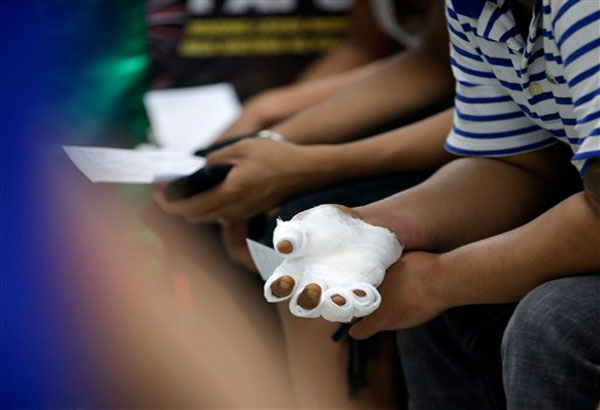Gov’t milking Japanese promoters, OPAs claim
May 1, 2005 | 12:00am
Are they being milked for all they’re worth?
An organization of overseas performing artists (OPAs) is accusing some government officials of turning Japanese promoters into "milking cows" through the imposition of the verification system and escrow bond requirement.
The Philippine Overseas Entertainment Industry (POEI) and the Federation of Talents/Managers of the Philippines (FETMOP) said some officials of the Department of Foreign Affairs (DFA) and the Department of Labor and Employment (DOLE) had earned commissions from fees collected from the regulations.
The DFA and the DOLE, including its attached agency the Philippine Overseas Employment Administration (POEA), imposed a verification system and escrow bond requirement on Japanese promoters.
However, after protests were lodged by the Tokyo promoters, these regulations were suspended by Ambassador to Japan Domingo Siazon in an apparent bid to promote the deployment of OPAs.
POEI president Willie Espiritu said they are supporting Siazon’s move to revive the interest of Japanese promoters in Filipino performers.
The OPA group said Japan was well within its rights to reject the existing verification system and escrow bond requirement applied by the Philippine Embassy in Tokyo and the Philippine Consulate General in Osaka.
Japan’s Ministry of Justice, in an April 11 note verbale sent to the Philippine Embassy in Tokyo, asked the Philippine government to immediately suspend the regulations, which Tokyo said are discriminatory and which violate international laws.
Espiritu also said the DFA/DOLE’s verification system for Japanese promoters is discriminatory and that the verification fee of 7,000 yen per entertainer recruited is an additional burden to the Japanese promoters.
According to him, Japan protested that the escrow bond requirement of $20,000 (roughly P1 million) is discriminatory, as it is imposed only on Japanese promoters.
Espiritu also called on the Japanese government to investigate the procedures followed by Philippine authorities in obliging Japanese promoters to secure visa authorizations from the POEA or the Bureau of Immigration when they recruit performers in the Philippines.
An organization of overseas performing artists (OPAs) is accusing some government officials of turning Japanese promoters into "milking cows" through the imposition of the verification system and escrow bond requirement.
The Philippine Overseas Entertainment Industry (POEI) and the Federation of Talents/Managers of the Philippines (FETMOP) said some officials of the Department of Foreign Affairs (DFA) and the Department of Labor and Employment (DOLE) had earned commissions from fees collected from the regulations.
The DFA and the DOLE, including its attached agency the Philippine Overseas Employment Administration (POEA), imposed a verification system and escrow bond requirement on Japanese promoters.
However, after protests were lodged by the Tokyo promoters, these regulations were suspended by Ambassador to Japan Domingo Siazon in an apparent bid to promote the deployment of OPAs.
POEI president Willie Espiritu said they are supporting Siazon’s move to revive the interest of Japanese promoters in Filipino performers.
The OPA group said Japan was well within its rights to reject the existing verification system and escrow bond requirement applied by the Philippine Embassy in Tokyo and the Philippine Consulate General in Osaka.
Japan’s Ministry of Justice, in an April 11 note verbale sent to the Philippine Embassy in Tokyo, asked the Philippine government to immediately suspend the regulations, which Tokyo said are discriminatory and which violate international laws.
Espiritu also said the DFA/DOLE’s verification system for Japanese promoters is discriminatory and that the verification fee of 7,000 yen per entertainer recruited is an additional burden to the Japanese promoters.
According to him, Japan protested that the escrow bond requirement of $20,000 (roughly P1 million) is discriminatory, as it is imposed only on Japanese promoters.
Espiritu also called on the Japanese government to investigate the procedures followed by Philippine authorities in obliging Japanese promoters to secure visa authorizations from the POEA or the Bureau of Immigration when they recruit performers in the Philippines.
BrandSpace Articles
<
>
- Latest
- Trending
Trending
Latest
Trending
Latest
Recommended

























